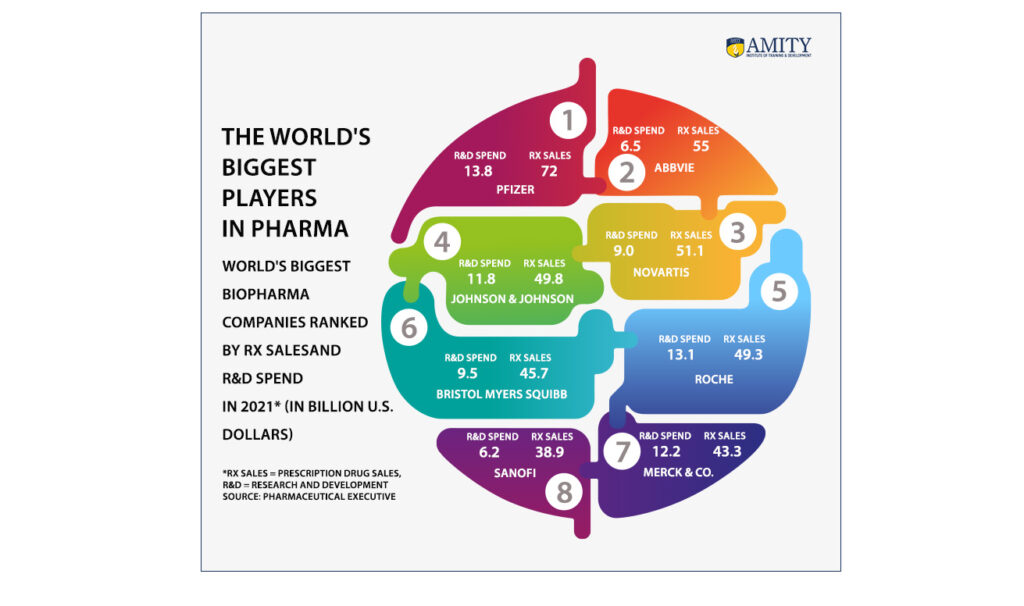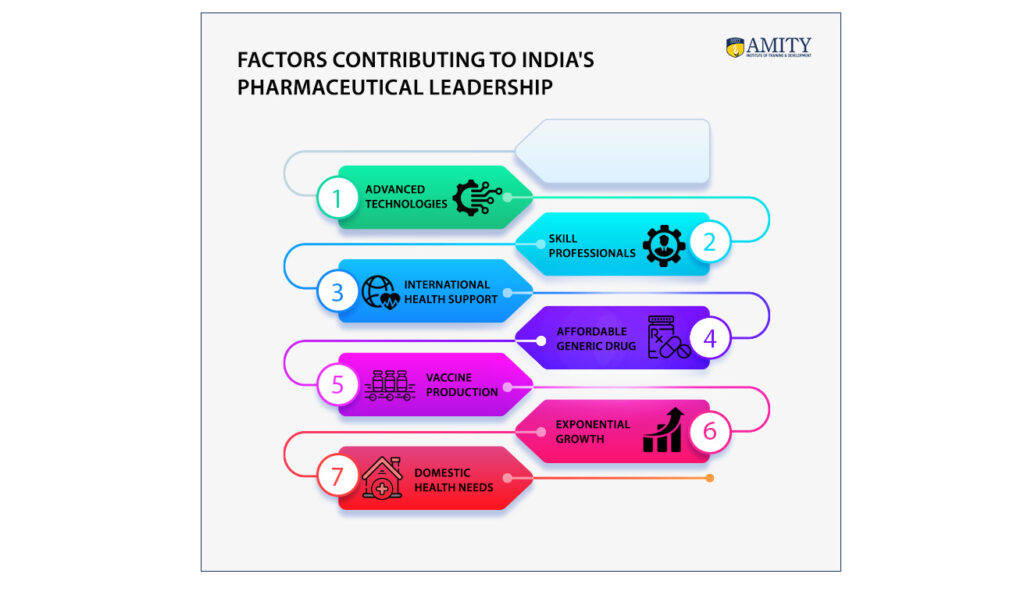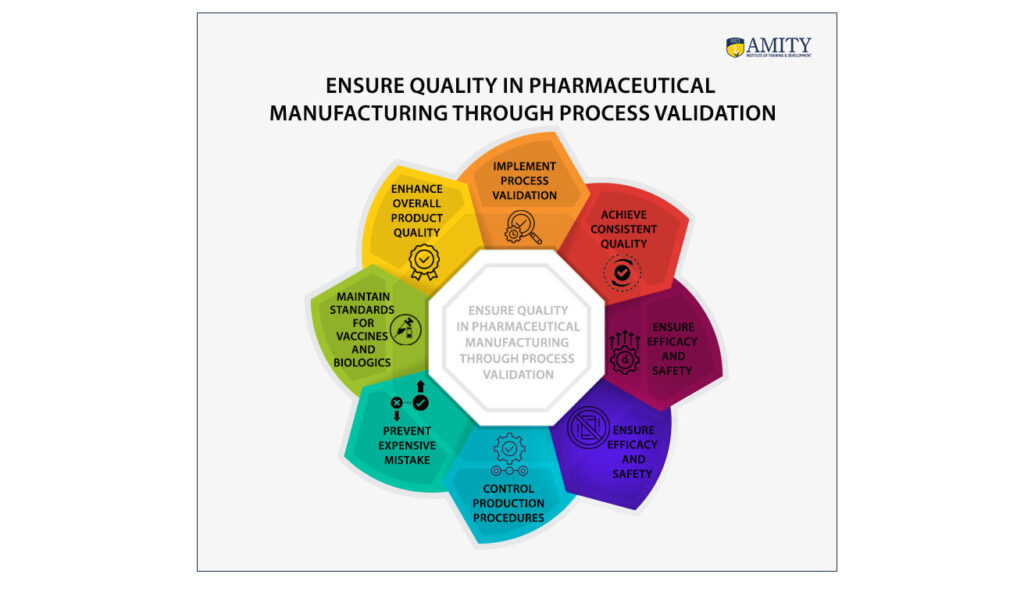Tech-Driven Solutions

The pharmaceutical industry is one of the most vital sectors in global healthcare, making life-saving medicines and furthering discoveries into medical research. This comprises the discovery, development, manufacture, and marketing of pharmaceutical goods focusing on enhanced patient outcomes. The pharmaceutical industry-from small startups to multinational pharmaceutical companies-has significantly contributed to the betterment of global health challenges.

Source: Statista
India’s pharmaceutical industry is a global leader in the area of producing affordable generic drugs and vaccines. In recent times, it has become one of the world’s biggest producers of medicines, growing at a speed that is exponential, supporting health needs not only within the country but also abroad. To maintain its competitive leadership, however, the drug industry needs development of skilled professionals and advanced technologies.

Did You Know?
India is also known as the “Pharmacy of the World” because the country produces so many high-volume generic drugs and vaccines.
Pharmaceuticals Industry Overview: Importance and Key Processes in the Pharmaceutical Industry
The pharmaceutical sector holds a very important place in safeguarding global health, not just because of its contribution towards the development of life-saving drugs, but also because it acts as fuel for the push to include medical sciences themselves. The pharmaceutical sector is a crucial pillar of the national economy in India, and globally, Indian pharmaceuticals are recognized for their capability to produce affordable generics and vaccines at scale. Such is the contribution made by the Indian pharmaceutical sector to healthcare worldwide; thus, this forms a bright example of how a robust industry can meet the dual need in both the local and global areas of health.
The pharmaceutical industry is very crucial. From R&D, the industry has innovation; hence it tries to have new treatments produced as well as improve the existing ones for greater efficacy and safety. Research and Development departments in a pharmaceutical industry are the sites of cutting-edge research trying to discover new therapies for drugs that meet unmet medical needs. This kind of innovation promotes growth as well as the reputation of the industry, which further enhances its stay in the global market.
Another significant aspect of the pharmaceutical industry is change control. Change control ensures that changes in the manufacturing process, equipment, or protocols have been reviewed on the implications of the product’s quality. This procedure is vital for having uniform quality in all the products under production and therefore protects the health of patients. For instance, vaccines or biologics; an error in a single mismatch might lead to serious danger; hence, change control helps avoid such a mishap.
For instance, the Sun Pharma or Cipla, an Indian pharmaceutical giant, has pretty stringent change control processes that enable them to remain competitive in the overseas markets while strictly adhering to global quality standards.
Top Pharmaceutical Industry Players
The pharmaceutical industry has been on top of the list of industries in terms of market capitalization over years. The pharmaceutical companies in India and around the globe, which top the list include, Pfizer, Novartis, and Roche that lead the world through innovative R&D efforts across the globe.
Source: Drug Discovery Trends
Sun Pharmaceutical, Dr. Reddy’s Laboratories, and Cipla, among others, are Indian companies which have now evolved into industry giants that play a significant role in the global supply chain for inexpensive medicines. The main quality standards that these organizations have maintained include quality assurance in the pharmaceutical industry whereby they ensure to meet all regulatory standards of any country in the world.
Quality assurance is part of the significant pharmaceutical industry overview, whereby every product that hits the market should be proven to be safe and effective. Good Manufacturing Practices also need to be adhered to ensure that pharmaceutical companies hold credibility.
Why Quality Assurance and GMP are Critical in the Pharmaceutical Industry
Quality assurance in pharmaceutical products is necessary. GMP (Good Manufacturing Practises) in the pharmaceutical industry embraces the regulations that control the production process to ensure that products are always manufactured to the required standards. And so, of course, a company adhering to GMP not only sees that pharmaceuticals are safe for consumption but also ensures companies maintain their reputation on a global level. Quality assurance in the pharmaceutical industry plays a key role because it basically provides a structured approach to prevent defects in manufactured products.
In the pharmaceutical industry, validation in the pharmaceutical industry holds another crucial element of quality assurance. It pertains to documentation and verification of procedures and equipment used in the manufacturing process to guarantee uniform quality in every batch. After all, this validation is of extreme importance in maintaining the confidence of healthcare providers and patients.
What are the Roles of Technology and Innovation in the Pharmaceutical Industry?
With the advancement of science at a fast pace, technology transfer within the pharmaceutical industry becomes a crucial need. Under technology transfer, new drug formulations are directly transferred from the R&D stage to the full-scale manufacturing level so that innovations can be scaled up for mass production. Advanced technologies such as automation and data analytics help streamline production while delivering real-time quality control.
In addition, through the integration of technology in R&D, the industry innovates better. The R&D department in the pharmaceutical industry strives to find new treatments and enhance the ones already on the market while constantly advancing medical science.
Did You Know?
India is one of the leading suppliers of vaccines to other countries worldwide, used to immunize people against diseases.
What Are the Key Career Opportunities in the Pharmaceutical Industry?
This ranges from research and development to manufacturing, regulatory affairs, and marketing. Millions of people work in the pharmaceutical industry in India; hence, the demand for qualified professionals is on a rise. The key career areas include:
Quality Assurance:
All processes should meet the regulatory standards.
Pharmaceutical Manufacturing:
Managing the production of pharmaceuticals and ensuring their high quality.
R&D:
Conducting state-of-the-art research to manufacture new drugs.
Regulatory Affairs:
Working on regulatory compliance that ensures all regulations local and international.
The Indian pharmaceutical industry offers exciting career prospects for those who are keen on the ambit of this field of industrial pharmacy, validation, and regulatory requirements.
Does Process Validation Improves Pharmaceutical Manufacturing?
Process validation in the pharmaceutical industry is a way of ensuring that production procedures are controlled and result in the desired quality every time. This can prevent expensive mistakes and ensure efficacy and safety in the products. For vaccines, biologics, and complex treatments, it’s a very big deal if there’s even a slight deviation from the norm.

It, also keeps product integrity intact in the pharmaceutical industry. Change control is applicable to manage changes in the production and quality control processes. The change is evaluated for its impact on the quality of the product.
Indian Pharmaceutical Industry: A Global Comparison
The Indian pharmaceutical industry is one of the largest in the global market. It represents the largest generic medicine providers across the globe and constitutes more than 20% of the volume in exports worldwide. India ranks highly in the production of active pharmaceutical ingredients (APIs) and finished dosage forms (FDFs) in terms of share in the global pharmaceutical industry.
The pharmaceutical manufacturing companies of India have left their marks in relation to having cheap yet quality medicines. In addition, the government support toward local manufacturing has also enhanced the nation’s position in the pharmaceutical sector of the world. There exist several pharmaceutical companies of India. The variety of the companies gives strength to the entire sector.
Did You Know?
India exports medicines to over 200 countries, which includes heavily regulated markets like the U.S., U.K., and Europe.
What Are the Different Types of Pharmaceutical Industries?
The types of pharmaceutical industries can broadly be classified into different categories based on what they manufacture:
Generic Drugs
These are drugs that have expired from patents and are in essence the same as branded drugs in terms of dosage, safety, and efficacy but are sold at a lower price.
Branded Pharmaceuticals
Drugs developed by major pharmaceutical companies under a brand name.
Biopharmaceuticals
The drugs that have come out from living organisms including vaccines, gene therapies.
Over-the-Counter (OTC) Products
Those medicines that the patient can purchase over the counter.
Each of the types of pharmaceutical industry has specific production requirements, quality needs, and market drivers.
How AITD Can Help?
In the fast-developing pharmaceutical environment, training and skill building are very much on the high priority list that enables them to stay updated about the dynamic state of the pharmaceutical industry. Amity Institute of Training & Development (AITD) offers all customized programs to the professionals and organizations of the pharmaceutical sector by keeping them updated on the latest developments as well as the changes in regulations. AITD’s focus areas are as follows:
Skill Gap Identification
Workforce deficiency through specifically designed training.
Scientific Approach and Innovation
Research work and introduction of new technologies.
Employee Engagement
Promotes a productive work environment.
Current Market Analysis & Research
Best practices to industry, informative analysis.
Role Progression (What Next)
Aiding in employee progression.
Workforce Management
Extracting maximum talent and resources for a pharmaceutical company.
Through these identified areas, AITD ensures that the pharmaceutical professional is developed to accomplish his job requirements successfully.
Final Thoughts/Conclusion
The pharmaceutical industry is an integral part of the global healthcare system. The progress in pharmaceutical industries seems to have no upcoming end. The growth of this pharmaceutical industry in India means increasing demand for skilled professionals. Skill gaps could be bridged, innovation promoted, and career development fostered through programs like AITD.
Increased focus on quality assurance, process validation, and GMP practices make organizations increasingly invest in developing their workforce for sustained success in the global marketplace. The future of the industry will depend on continuing a successful pursuit of excellence in manufacturing, innovation, and regulatory compliance.
Frequently Asked Questions
1. What is the role of quality assurance in the pharmaceutical industry?
Quality control is an assurance that pharmaceutical products comply with the regulations of different countries and are safe for consumption .
2. Why validation in pharmaceutical manufacturing?
Validation ensures reproducibility of processes in obtaining the desired quality. This reduces the chances of errors with patient safety being guaranteed.
3. Career opportunities in pharmaceutical industry?
Career opportunities associated with pharmaceutical industries include R&D, quality assurance, manufacturing, and regulatory affairs.
4. What is the Indian pharmaceutical industry’s role in world health?
The Indian pharmaceutical industry is the largest manufacturer of generics in the world and offers cheap medicines to millions around the globe.
5. Why is process validation essential in pharmaceutical manufacturing, in your opinion?
Process validation will ensure that all processes used for production are controlled. This results in the product being made with a certain quality and safety.
6. How does AITD facilitate career advancement in the pharmaceutical world?
AITD also undertakes programs on gaps in the skill areas, innovation, and engagement of the employees within the pharmaceutical industry to help professionals develop their careers and put their organizations on solid footing.







